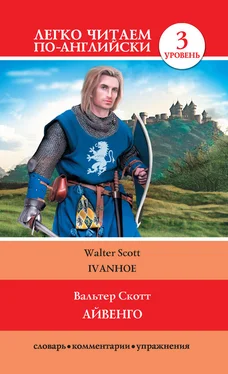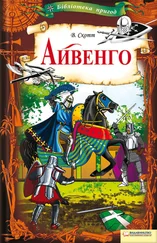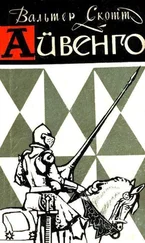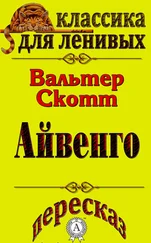1 ...7 8 9 11 12 13 ...26 “My lazy friend,” answered the hermit, “believe me, it is better to enjoy the good which God sends you, than to be too curious about where it comes from. Fill your cup, and do not make me by more impolite questions show you that I can fight you.”
“You make me more curious than ever!” said the knight, “And do not threaten me, holy man, because my profession is to find danger wherever it can be found.”
“Sir Lazy Knight, I drink to you,” said the hermit, “respecting your courage but believing you to be unwise. I can oppose you with any arms. What do you say about these, good friend?”
He opened another hidden door, and took out a couple of swords and small shields. The knight, who watched his host, noticed that inside this second hidden cuproard there were two or three good long-bows, a cross-bow, many arrows and a harp.
“I promise you, brother Monk,” said he, “I will ask you no more questions. The contents of that cupboard are an answer to all of them. And I see a weapon there” (he took out the harp) “on which I would more gladly prove my skill, than at the sword and shield.”
“Sit down then, Sir Knight,” said the hermit, “and fill your cup, let us drink, sing, and be merry. If you know a good song, you will be welcome at Copmanhurst as long as I live. Friend, I drink to your successful performance.”
So saying, he drank his cup with much ceremony.
The knight in the meantime had brought the strings into some order, and after a short prelude asked what he should sing.
“A ballad, a ballad,” said the hermit, “only English ballads should be sung in this house.”
“I will try, then,” said the knight, “a ballad composed by a Saxon minstrel, whom I knew in Holy Land.”
It was soon clear, that if the knight was not a complete master of the minstrel art, he at least had good teachers. When the song was ended, the monk declared it a good one, and well sung.
The monk then reached the harp, and entertained his guest with a funny song called ‘The Barefooted Friar’. Their party was becoming more and more wild and cheerful, when it was interrupted by a loud knock at the door.
* * *
When Cedric the Saxon saw his son drop down senseless in the lists at Ashby, his first impulse was to order his servants to go and carry the wounded knight to a safe place. But he could not acknowledge in public the son whom he had banished and disinherited. Cedric’s dream was to unite all Saxons in the country, and for that he needed a leader of royal blood. Both Athelstane and Rowena had famous Saxon kings among their ancestors, so Cedric thought that their marriage was the key to Saxon unity. When Rowena fell in love with Cedric’s son, he didn’t hesitate to banish Wilfred from his house. Cedric hoped that, during Wilfred’s absence, Rowena will forget him, but he was disappointed. Rowena declared that she would rather go to a monastery, than share a throne with Athelstane. Cedric, who respected his ward, didn’t know how to use his authority of a guardian.
Although Cedric considered the sudden and romantic appearance of his son in the lists at Ashby to be a death’s blow to his hopes, he still ordered his servant Oswald to keep an eye upon Wilfred and to carry him to Ashby in secret as soon as the crowd had dispersed. Oswald, however, came too late to do this. The crowd dispersed, indeed, but the knight was nowhere to be seen.
Instead Oswald found Gurth who was looking for his young master and forgot to hide his face. Oswald decided that it was his duty to hold Gurth and brought him to Cedric. The only thing that Oswald learned about the fate of the young knight was that the knight had been raised with care by some servants, and placed in a litter belonging to a lady among the spectators, which had immediately transported him out of the crowd. Oswald decided to return to his master for new instructions.
The Saxon worried for his son, but as soon as he was informed that Ivanhoe was in friendly hands, he again started to think about Ivanhoe’s disobedience. When Cedric saw the deserter Gurth, he ordered to tie him. Gurth did not protest, he only said, “This is how you reward loving your flesh and blood better than my own.”
Cedric, Athelstane and Rowena went back to Rotherwood. Wamba and Gurth rode side by side for some time, during which Gurth maintained a moody silence.
* * *
The travellers had now reached the wooded country which was considered dangerous at that time because of the number of robbers. There they heard repeated cries for assistance. When they came closer, they saw a litter left on the ground, an old Jew and a young woman. It was Isaac of York with his daughter. They had hired six guards at Ashby, together with mules for carrying the litter of a sick friend. This party had promised to escort them. They had come to this place in safety, but when their guards heard from a wood-cutter that there was a strong band of robbers in the woods before them, Isaac’s mercenaries had ran away and had taken with them the horses which bore the litter.
“If you allow us to come with you,” added Isaac, in a tone of deep humiliation, “we will be very grateful.”
Athelstane remembered the Jew from Ashby and didn’t want to take him, but Cedric said, “We should leave them two of our servants and two horses to bring them back to the next village”.
At this moment Rebecca suddenly ran to Rowena’s horse, knelt down, and kissed Rowena’s dress. Then she begged her in the great name of the God whom they both worshipped, that she would have compassion upon them, and let them go forward under their protection. “It is not for myself that I ask this,” said Rebecca, “but for the sake of our sick friend.”
“The man is old and weak,” said Rowena to her guardian, “the maiden young and beautiful, their friend sick—even though they are Jews, we cannot as Christians leave them here. We should give them two mules to transport the litter and two horses for themselves.” Cedric agreed to this.
This was the reason Gurth had to get down from his horse, and when Wamba untied him for that reason, he ran into the forest and disappeared.
The road now became very narrow, so that only two riders could ride together, and crossed a small river with swampy banks. Cedric and Athelstane, who were at the head of their party, saw the risk of being attacked at this place and they decided to cross the river quickly. They had just crossed it with a part of their followers, when they were attacked from all sides at once so quickly that they could not defend themselves. Both Saxon nobles were made prisoners at the same moment. The servants, the Lady Rowena, and the Jew and his daughter in the rear all fell into the hands of the attackers.
Nobody escaped except for Wamba, who showed in that situation much more courage than those who pretended to be wise. He took a sword from one of the servants, drove back several who approached him, and made a brave though ineffectual attempt to rescue his master. When he saw that he couldn’t do it, he jumped from his horse and ran into the forest.
“I have heard men talk about the blessings of freedom,” he said to himself, “but I wish any wise man would teach me how to use it now when I have it.”
He pronounced these words aloud, and a voice very near him called out in a low and cautious tone, “Wamba!”
“Gurth!” answered Wamba, with the same caution, and the swineherd immediately stood before him.
“What is the matter?” said he, “what do these cries mean?”
“They are prisoners to green cloaks and black masks,” said Wamba.
At this moment a third person suddenly appeared and commanded them both to stop. Wamba recognised Locksley the yeoman, who had been victorious in the contest for the prize of archery.
Читать дальше
Конец ознакомительного отрывка
Купить книгу












